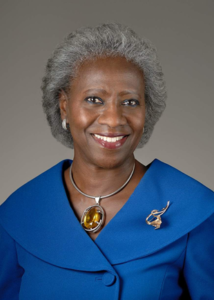This is part of the #BlackCardioInHistory series. #AHAEarlyCareerVoice is partnering with #BlackInCardio to feature a series of profiles of black/African American Cardiologists for #BlackInCardioWeek2020. For more information: blackincardio.com

(3) The NIH Director. Statement on the Retirement of Dr. Hannah Valantine. 9-1-2020. https://www.nih.gov/about-nih/who-we-are/nih-director/statements/statement-retirement-dr-hannah-valantine
Originally from The Gambia, West Africa, Hannah Valantine moved to London, where she studied Biochemistry and then obtained a medical degree from St. George’s Hospital Medical School in 1978 (1). She completed her post-graduate work in cardiology at two hospitals in London: Brompton and Hammersmith (2). She moved to the United States, where she was awarded an NIH Director’s Pathfinder Award for Diversity in the Scientific Workforce (2). She became a fellow and worked her way up to being a Professor of Cardiovascular Medicine at the Stanford University School of Medicine before being appointed as Senior Associate Dean for Diversity and Faculty Development in 2005 (1).
In 2014 Dr. Valantine was appointed as NIH’s first Chief Officer for Scientific Workforce Diversity, a new position with the entire focus being on diversity in biomedicine (2).
During her time at the NIH, she established the Distinguished Scholars Program, which has had a dramatic, positive impact on the diversity of tenure-track investigators at NIH (3). To implement the recommendations of the NIH Equity Taskforce, she developed and implemented the first NIH Workplace Climate and Harassment Survey (3). This scientifically rigorous survey achieved a high response rate from NIH employees, contractors, fellows, and trainees who will have a lasting impact on institutions around the United States (3).
Dr. Valantine also designed the Faculty Institutional Recruitment for Sustainable Transformation (FIRST) program which is aimed at creating cultures of inclusivity at NIH-funded institutions (3). She also pioneered a program to mentor and support scientists from diverse racial and ethnic backgrounds in writing effective grant applications (3).
In September 2020, Dr Valantine’s retirement was announced after what has been a truly remarkable career (3). Dr. Valentine’s career embodies the representation that institutions around the country and world are striving to have, and she is a role model for what other underrepresented scientists can achieve. Her work has and will continue to open doors for people in underrepresented groups in science and medicine.
Reference
- Hannah Valantine. Wikipedia. https://en.wikipedia.org/wiki/Hannah_Valantine. Accessed 10-19-2020.2.
- Hannah Valantine, M.D., named NIH’s first Chief Officer for Scientific Workforce Diversity. 1-30-2014. https://www.nih.gov/news-events/news-releases/hannah-valantine-md-named-nihs-first-chief-officer-scientific-workforce-diversity
- The NIH Director. Stetement on the Retirement of Dr. Hannah Valantine. 9-1-2020. https://www.nih.gov/about-nih/who-we-are/nih-director/statements/statement-retirement-dr-hannah-valantine
“The views, opinions and positions expressed within this blog are those of the author(s) alone and do not represent those of the American Heart Association. The accuracy, completeness and validity of any statements made within this article are not guaranteed. We accept no liability for any errors, omissions or representations. The copyright of this content belongs to the author and any liability with regards to infringement of intellectual property rights remains with them. The Early Career Voice blog is not intended to provide medical advice or treatment. Only your healthcare provider can provide that. The American Heart Association recommends that you consult your healthcare provider regarding your personal health matters. If you think you are having a heart attack, stroke or another emergency, please call 911 immediately.”